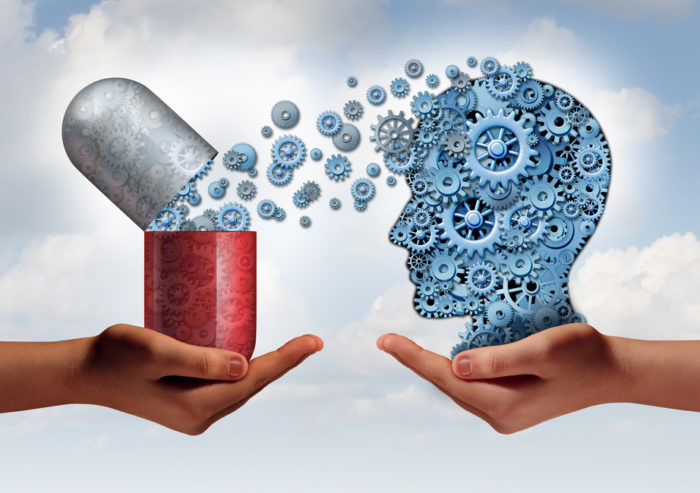
Nootropics: A Beginners Guide to Brain Boosting Nootropics
Boosting brain performance and increasing cognitive ability all sounds a little too good to be true. But girl, nootropics really can deliver. Read on and find out exactly what they are, how they can help and whether you should be taking them.
Manufacturers claim they can improve your memory, creativity, focus and motivation. Now we’re all for improving our health, and that all sounds awesome, but is messing with your brain ok?
Self-confessed “neurohackers” all over the world seem to think so and apparently, it’s not actually ‘messing’. More like augmenting.
Nootropics have experienced a huge boom in popularity in the last few years, with huge promises of improved brain function and boosted cognitive performance. What’s more, those who take them are saying they can really feel the benefits too.
There are so many nootropics out there, both synthetic and natural that claim to deliver these amazing results. To find out if they really do, we delve right into this exciting new area. We find out exactly what Nootropics are, how they do what they do and whether they’re worth your money.
What are nootropics?

Without going into all the sciency stuff straight away, nootropics are essentially brain boosters. Just as you might supplement your muscles to work more efficiently, a nootropic does just that, but for your brain.
These supplements contain ingredients that enhance your brain health and improve overall cognitive functions. This translates into a number of benefits including:
- Better focus
- Increased attention span
- Boosted motivation
- Enhanced alertness
Plus, according to advocates, nootropics deliver all of the above as well as improving your mood and making you feel more relaxed.
As research around them grows, we see more and more nootropics on the supplement market. Some are entirely natural, and some are synthetically created. Before you buy, it’s a good idea to educate yourself on what they do, how they affect you and whether or not they’re safe. Read on, girl.
How do nootropics work?
The benefits sound great right?! Whether you’re looking for an edge at work, or are running ten projects at once, a nootropic can help you out.
To fully understand how they deliver these brain-boosting benefits, we need to know how they work. The truth is, there are many ways they can help to improve your cognitive performance. None of it is witchcraft or weird super-natural science either. Check it out:
How nootropics work:
- Improving communication – The neurons within your brain communicate with each other via neurotransmitters to regulate every cognitive function and reach memories. Nootropics can support this by helping your brain produce more neurotransmitters and increasing the sensitivity of receptors. This should help to improve learning ability and memory.
- Rebuilding tissue – Some nootropics offer the ability to signal growth factor synthesis. This could help the brain growth process and help the body to develop neuronal tissue.
- Boosting blood flow – By maintaining blood vessels within the brain, nootropics may help to deliver more oxygen and essential nutrients where they’re needed.
- Protecting the brain – Neuroprotectors within nootropics may help to shore up your brain’s natural defenses against issues that could cause damage.
- Increase energy – A nootropic may improve the efficiency of energy processes within your brain. This is important as your brain demands around 20% of the energy your body produces.

Different types of nootropics
There are so many ingredients out there that offer a range of nootropic qualities. We’ve rounded up all the main types of nootropics, what they do and examples of where you can find them.
Amino acids
These molecules are used throughout your body, and in the brain they’re on of the most versatile, multi-functional nootropics available. They’re a precursor to dopamine, regulates serotonin and GABA, and even improves neurotransmission.
These will help to increase attention, motivation and your ability to concentrate. They also enhance your memory which, in turn boosts your ability to learn.
Examples of amino acid nootropics: L-Theanine, N-Acetyl L-Tyrosine
Nutrients
Just like any other part of your body, your brain needs nutrients to stay healthy and boost vitality. These come in the form of vitamins and minerals. You can usually get these in your leafy greens and through a healthy diet, however supplementation can occasionally boost performance.
Nutrients can help to improve the efficiency of neurotransmitters, keep you brain energy high and improve circulation.
Herbs
Mother Nature created plenty of powerful nootropic ingredients that really pack a punch. From roots to leaves, extracts from a number of natural products can have a positive impact on your cognitive abilities.
They can help to improve concentration, boost your creativity and help you retain more information.
Phospholipids
This nootropic is a naturally occurring fat that’s present in both your brain and a number of the foods we eat. For example, phospholipids can be sourced from egg yolks, fish and soy, among others. As we get older, your phospholipid levels begin to decline, so it can be very beneficial to top up on this important nootropic.
Phospholipids play an essential role in the growth of brain cells and overall repair.
Adaptogens
These are included within herbal nootropics. However, it’s worth knowing their specific function, especially in a modern, stressful world, as Adaptogens are specific nootropics that hold stress-combatting abilities. Much in the same way your muscles grow stronger when you put them under strain in a workout, adaptogens improve your brains ability to adapt to stress. Ultimately, they help make you feel calmer, more focused and emotionally stable.
Choline
This natural nootropic helps your body to make and efficiently use fats. This is important, because believe it or not, your brain is mostly made up of fat. As such, choline plays a big part in helping to keep your brain healthy, improving it’s ability to repair itself and maintain plasticity.
Due to their brain maintaining properties, choline nootropics help to boost your mental energy too. This also improves your mood and enhances your ability to retain information and memory.
Synthetics
Although this isn’t specifically a ‘type’ of nootropic, we felt we had to mention the synthetic options out there.
Some nootropics are only available via prescription and are synthetically created to bring you certain results. You may recognize a few of them. For example, Adderall and Ritalin are both widely prescribed to help with focus and mood control.
Synthetic options tend to be more powerful than natural nootropics, which is why they usually need to be prescribed by a doctor to treat a certain issue. They can also come with side-effects and, when abused by taking too much, can have adverse effects to brain function.

Are they safe and legal?
Nootropics aren’t a new development and, for the most part, they’re all legal.
You may be taking a nootropic every day in your favorite mug without even realizing it. For example, caffeine is a type of nootropic – it keeps you focused and improves attention span.
Although you may be taking these more than you realize, that doesn’t necessarily mean they’re always safe.
The fact of the matter is, the nootropics industry has rapidly grown in the last few years, and this has happened without any real kind of regulation. Therefore, there are quite a few products out there that may give you some unwanted side effects.
To ensure safety, one of the best things you can do is avoid stacks or pills that use synthetic chemicals, unless you’re prescribed them by your doctor. If you are prescribed them, stick to the recommended dose to avoid any adverse symptoms.
Instead, opt for the all-natural products, where manufacturers back their ingredient choices and dosages with legitimate scientific research.
If you follow these guidelines, you should be safe while you use nootropics. However, if you’re worried consult your doctor before you buy anything.

Do nootropics have any side effects?
Some of the synthetically created nootropics can leave far more than a bad taste in your mouth.
Adderall has been noted to cause anxiety, reduce sex drive and make you sweat. Ritalin can result in insomnia, stomach issues, headaches and a lack of appetite.
In terms of natural options, the majority of nootropics that harness the power of Mother Nature present a much lower potential for adverse symptoms.
If your nootropic stack comes with caffeine, ensure you have it with plenty of water to avoid dehydration.
Always stick to the recommended guidelines when you take your natural nootropics and you should avoid any potential side-effects.
Related article: Pre-Workout Side Effects (And How to Avoid Them)
Should I take them?
If you find it hard to concentrate or you’re feeling overwhelmed by work, then a nootropic can go a long way to help.
People all over the world have used them and seen the results.
However, tracking down the individual nootropics and taking them can be a little difficult and not the best way to reap all of the rewards. For an all-round boost to your cognitive performance, we recommend using a nootropics stack.
A good stack will contain a range of ingredients designed to boost your cognitive performance in a number of different ways. They should give you the best chance to benefit from all the brain boosting properties of a variety of different nootropics.
If you do decide to take them, our advice is simply stick to the natural, well-researched ingredients that are proven to provide the results you’re looking for.
Thoroughly explore the products out there and find the one that ticks all the right boxes.
Conclusion
As with any other form of supplementation, the trick is to know what you’re looking for and do your research. Now you know what a nootropic is and what kind of benefits you can expect, you can head out into the world of this brain boosting supplement with confidence.
As always, we recommend looking out for all-natural options, that are widely used and are backed by science. Don’t go for anything synthetic, your body just isn’t ready to handle that kind of thing!
The best way to see if nootropics work for you is to head out there and try one out for yourself. Thoroughly explore the products available and find the one that ticks all the right boxes.

